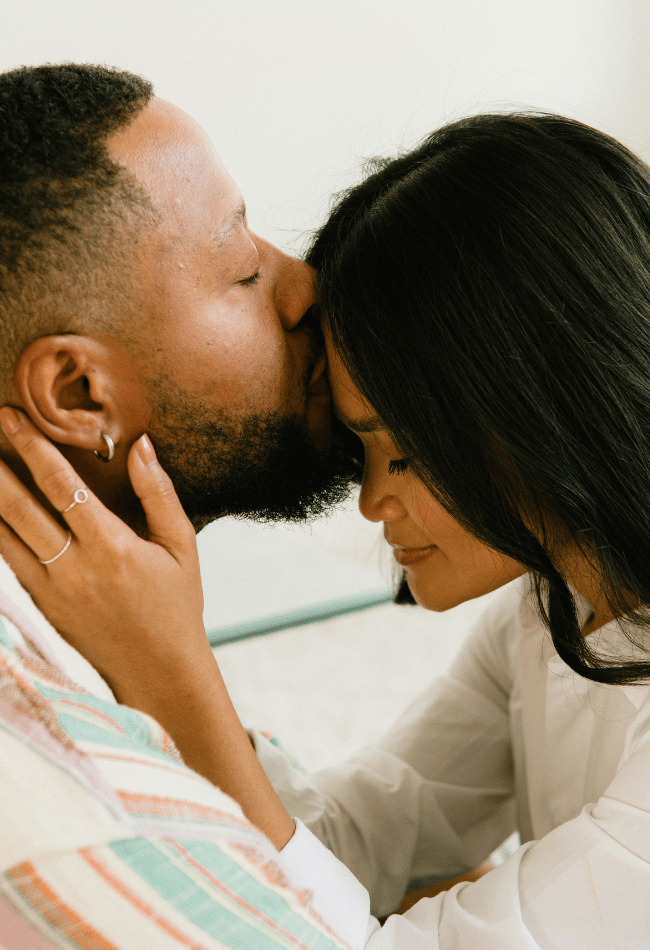Takeaway: How can we create a deeper sense of trust and intimacy in our relationship? Many of our couples therapy clients ask before starting their journey with trust. Based on our experience, we’ve created these trust-building exercises for all types of couples with unique problems, from reigniting a spark in a long-term partnership to learning what trust means in the first few months of a new committed relationship. Keep reading to find something that works for you and the dynamic of your partnership.
If you’re reading this article after Googling “trust-building exercises for couples…,” you’re in the right place.
When you find it difficult to trust your spouse, it’s even more challenging to figure out how to rebuild trust — much less the connection and confidence you once had.
Low points are inevitable in every relationship, whether it’s a newlywed couple beginning a marriage or seasoned partners navigating long-term commitments.
Although common, weakened trust can lead to strong feelings of hurt, insecurity, and doubt—but that doesn’t mean that it’s a sign of failure in your relationship.
Rather, it’s an opportunity to get to know your partner better and build a stronger foundation for your partnership.
Couples therapy is a great place to learn how to start building trust, but it starts with a willingness to foster emotional intimacy and be vulnerable. If you’re still working toward that, let’s go through some trust building exercises.
Defining Trust
Sexual and emotional monogamy requires trust, dedication, honesty, and constant effort. While other couples you know might say that loving each other is enough, that’s not entirely the truth.
By definition, trust is “the firm belief in the reliability, truth, ability, or strength of someone or something.”
Here are a few questions you and your partner should ask to evaluate what trust means to both of you and how it looks in your relationship:

- Can you both openly discuss your fears, passions, and goals without fear of judgment?
- Do you feel confident that your partner will follow through on their promises and any commitment they make, no matter what?
- When faced with a challenge, do you know your partner has your best interest at heart?
- Are you comfortable sharing all aspects of your life with your partner, including your deepest secrets, knowing they’ll keep them confidential?
- Do you believe in your partner’s ability to support you emotionally, mentally, and physically through everything?
Why do couples lose trust?
All couples have difficulties with trust, even in the most healthy relationships.
However, trust is not often discussed in that context. At some point in your romantic relationship, you’ll struggle with trusting your partner about something.
Trust issues happen when you start to doubt your partner’s intentions. You may have direct proof of a breach of trust or only a hinting feeling that something isn’t right, but either way, it’s important to speak up and communicate openly to rebuild trust. For example, you might struggle to understand the other person’s feelings or ask your partner why they haven’t been interested in physical intimacy.
Some other reasons people lose trust in relationships include:
- They have childhood trauma
- One partner has an affair
- They’ve been abandoned by people they love in the past
- A partner has unrealistic expectations
- Their attachment style isn’t secure
- They aren’t getting their needs met
9 Best Trust Building Exercises For Couples
Actively investing in your relationship is key to gaining a better understanding of your relationship, making you feel safe and fully present with your chosen person. Here’s a list of my favorite couples’ trust exercises to help you start trust building in your relationship.
1. Have Weekly Check-Ins
Open communication is essential to having a healthy relationship, as it allows you to let your partner to feel heard, valued, and supported in a safe space. Check-ins are one way to do this.
Once a week, sit down with your partner and talk about your highest and lowest moments over the past few days, how secure you feel in the relationship, and any conflicts that happened.
2. In and Out Date Nights
Plan regular date nights to reconnect with your partner and deepen your bond outside daily routines. One partner can plan a night in while the other finds something to do outside the home.
This makes a weekly (or biweekly) date night a joint task where each of you puts in the same amount of effort. It also emphasizes diversity in your routine and shows that you trust each other enough to plan a fun evening.
3. Find a New Hobby
Likely, you and your partner entered the relationship with common hobbies and unique interests.
Finding something new to do together paves the way to see how your partner learns and find ways to have fun as a couple.
For example, try making a vision board to help you understand your needs and desires, ultimately strengthening your sense of trust.
To find out what to put on your vision board, here are some questions to ask:
- What matters most to you in the idea?
- What places do you want to travel as a couple?
- What do you want your family to look like in the future?
4. Share Something They Don’t Know About You
While you might have heard that having no secrets is part of a healthy relationship, most couples don’t know everything about each other.
To build trust, share something with your partner that you haven’t before — showing them you trust them enough to share secrets and confidential information.
If you don’t know how to start that conversation, ask them about their childhood, relationships with friends and family, or something that makes them nervous.
5. Learn Your Love and Apology Languages
According to Dr. Gary Chapman, the five love languages are words of affirmation, acts of service, receiving gifts, quality time, and physical touch.
Understanding these languages helps couples communicate love more effectively and build deeper emotional connections. In fact, they’re essential for rebuilding trust.
In the same realm of love languages, everyone also has their way of mending conflict in relationships. As outlined by Dr. Gary Chapman and Dr. Jennifer Thomas, the five apology languages include expressing regret, accepting responsibility, making restitution, genuinely repenting, and requesting forgiveness.
By identifying which apology language resonates most with you and your partner, you can tailor your apologies to meet each other’s needs and strengthen your relationship.
Take this apology language quiz to learn how you prefer to give and receive apologies.
6. Play 20 Questions
Twenty Questions is a fun way for romantic couples to learn more about each other without being too serious.
Take turns asking each other open-ended questions to explore interests, values, dreams, and fears, fostering curiosity and understanding between partners.
You can even turn it into a regular date night activity or incorporate it into your daily routine to deepen your connection and strengthen your bond.
7. Give Sweet, Thoughtful Gifts
When you’re out shopping, take a moment to browse the aisles and look for something small to take home to your partner.
This could be flowers, their favorite candy, or something they’ve wanted for a long time but haven’t bought.
Actions speak louder than words, especially when rebuilding trust and creating a successful relationship.
8. Eye Gazing
Looking into your partner’s eyes is one way to build a deeper connection with one another. This trust exercise might seem awkward, but it indicates your nonverbal signals regarding trust and security.
Sit close with your knees touching, and either set a timer or try to hold eye contact with each other for as long as possible, noticing who breaks it first.
Talk about your comfort level with the exercise and any other feelings that came up during it.
9. Speak Up and Be Open

Practice clear communication by expressing thoughts, feelings, needs, and desires respectfully and constructively.
This will put honesty at the forefront of your relationship and allow you to be authentic and transparent. It is also a way to hold each other accountable for building trust in a long-term commitment.
If you have trouble with this, seeing a couples therapist like myself is an effective way to have an outside source who can empower you to speak up for yourself in your partnership. I know navigating feeling lost, confused, or misunderstood is challenging.
You don’t have to be on the verge of separation or divorce to take advantage of therapy; it can provide invaluable support and guidance at any stage of your relationship.
Working with a therapist can help you evaluate your bond, set ground rules, and determine the best way to establish trust, communication, and intimacy.
Give us a call today to find a therapist that best meets your relationship needs.
